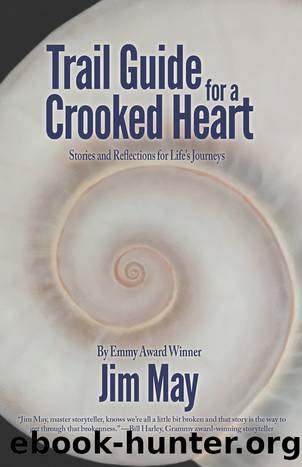Trail Guide for a Crooked Heart by May Jim;

Author:May, Jim; [May, Jim]
Language: eng
Format: epub
Publisher: Parkhurst Brothers, Incorporated, Publishers
Choosing a Crooked Path
The second, alternative story, presents a hypothetical scenario whereby Gandhiâs non-violent opposition would have been used in the WWII combat theater; how might a soldier like Frederick have responded?
. . . Then orders came to prepare for a possible attack. Frederick opened the throttle, muffled noise and vibration filled the cramped space. Then came an indistinct thump, and then another thump, thump. Thinking there was a break in the tankâs track Frederick stopped the tank and opened the hatch. He stretched himself up into the blue sky and spring sunshine.
There, stretched before the tanks, were hundreds of young, Belgian farmers in overalls. They lay on the ground willing to die, but not to kill for their country. They lay in rows as far as the eye could see in the direct path of the panzers, the core of Belgiumâs youth, many of them farmers just like Frederick.
Looking behind him, he saw the bodies of the young men that he, Frederick, and his grand machine, had crushed. Some were still moaning; others eerily silent, lying still next to puddles of blood that soaked into the loamy cropland.
Most of these bodies were dressed in work clothes, much the same as Frederick would have worn at milking time.
From his radio, came the voice of his commanding officer, ordering the panzer division to continue, to move forward into the sea of prostrated bodies. Frederick sat back down at the controls, his hands shaking; he engaged the clutch, the rumbling, bug-like, steel crawler moved ahead: thump . . . thump . . . thump!
Tears streamed down Frederickâs cheeks, he began to vomit. These farmers were of no threat to him. How could his commander, also a farmer, give such orders? He longed for home, for Regina, for his farm, for the calves, and for his tractor.
That night, he climbed out of his tank and disappeared into the woods. He would not fight this fight. He would leave the killing and return to Regina. Somewhere, somehow, he hoped to find them a place.
If the terrible sacrifice by these Belgian youths, the non-violentâthough powerfulâresistance described here in this story had been widespread, could the German army have maintained its Warrior myth (that these are not human beings that I am killing)? Furthermore, isnât it true that non-violent resistance renders moot the ethic of kill or be killed?
Download
This site does not store any files on its server. We only index and link to content provided by other sites. Please contact the content providers to delete copyright contents if any and email us, we'll remove relevant links or contents immediately.
Professional Troublemaker by Luvvie Ajayi Jones(29668)
Empire of the Sikhs by Patwant Singh(23089)
Twilight of the Idols With the Antichrist and Ecce Homo by Friedrich Nietzsche(18638)
Plagued by Fire by Paul Hendrickson(17416)
The Sun and Her Flowers by Rupi Kaur(14526)
Norse Mythology by Gaiman Neil(13372)
A Journey Through Charms and Defence Against the Dark Arts (Harry Potter: A Journey Throughâ¦) by Pottermore Publishing(9276)
Fangirl by Rainbow Rowell(9259)
Adultolescence by Gabbie Hanna(8929)
Wonder by R.J. Palacio(8584)
Tools of Titans by Timothy Ferriss(8402)
Becoming Supernatural by Dr. Joe Dispenza(8223)
How to Bang a Billionaire by Alexis Hall(8160)
Wonder by R. J. Palacio(8115)
Crystal Healing for Women by Mariah K. Lyons(7932)
The Road Less Traveled by M. Scott Peck(7605)
The Lost Art of Listening by Michael P. Nichols(7507)
The Witchcraft of Salem Village by Shirley Jackson(7277)
The Institute by Stephen King(7043)
